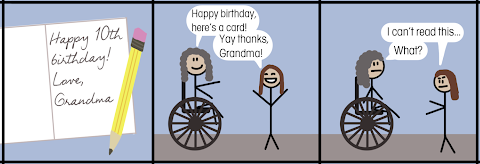The power of the pen: Handwriting is still important in the age of technology

Photo credit: Kaitlyn Barr
February 7, 2023
In recent years, students and teachers have become increasingly reliant on digital resources. Students begin using computers in elementary school, and typing has replaced handwriting in most areas of education. Many schools across the nation have stopped teaching cursive, opting for more modern forms of communication. Schools should prioritize handwriting over modern forms of writing, and elementary school students should learn cursive as a part of their early education.
Schools that prioritize handwriting in their curriculum are doing so to the benefit of their students’ learning and memory. These benefits have been proven in many studies, including an article from ocvt.org which states, “Forming letters by hand creates a connection with the movement of the hand to the visual response of seeing the letter on the page.” The article explains that typing is not as effective as handwriting because “it doesn’t require the same fine motor skills and simultaneous activity.” Because there is no connection between the hand and the brain when students type, there is also less learning and understanding of the content. Writing by hand is also better for studying because it improves memory, according to an 2022 article published by the National Education Association. When we write things down, our brain interacts more with the content, and the information becomes more memorable. We focus on physically writing it down rather than just typing it. The cognitive benefits of handwriting make it necessary for students to learn. Because of these advantages, this skill should be taught beginning in elementary school and continued throughout a student’s education. This will allow for better understanding of content and increased learning.
Handwriting is also still a major part of high school education. For many classes, essays and assignments are still given on paper in order to prepare students for standardized tests. The students who spent time in elementary school writing by hand can now write quickly and efficiently on high school assessments. However, those who grew up typing on their computers may find it difficult to do their work because they write slower than they type. Because handwriting is still used in high school, it is important for elementary schools to prioritize this skill. Doing so will allow students to be better prepared for high school, and it will help them succeed in their future classes.
Along with writing by hand, cursive is also necessary for students to learn. Only 21 states require that elementary school students learn cursive. Some say this is because students learn to type from an earlier age and rely on digital forms of communication. While typing is important in the age of technology, being able to understand cursive is still necessary. In school we often find ourselves reading documents or notes from teachers, or anyone from an older generation, that are written in cursive. Students in our district can comprehend these forms of writing because we learned how to read and write cursive in elementary school, while students who did not learn cursive often have trouble understanding them. These students are put at a disadvantage, and they may struggle with understanding historical documents and communicating with those in older generations. Because of this, teaching cursive to elementary school students still proves beneficial, as it is necessary for effective communication and the understanding of history. It is important for the education and success of students that schools continue to keep cursive in the curriculum.
Even though the use of technology continues to increase, it is still important that students learn how to read cursive and spend time handwriting when they are young. The benefits of traditional writing cannot be ignored and that schools should continue implementing these skills so students can become better learners and citizens of the world.











